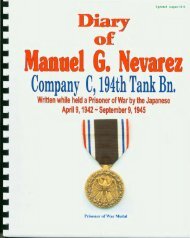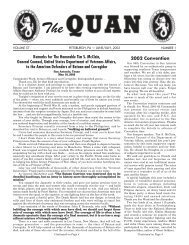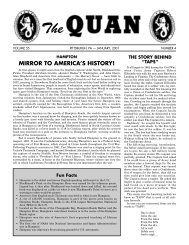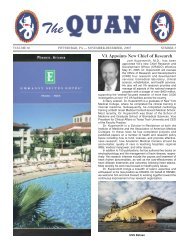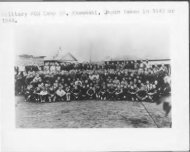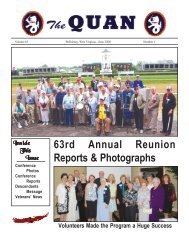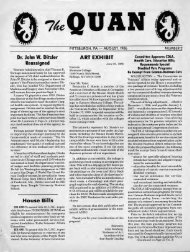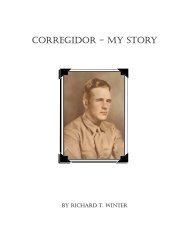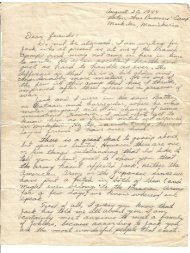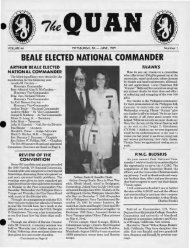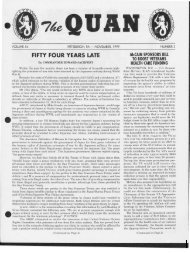Sept. 2003 - Philippine Defenders Main
Sept. 2003 - Philippine Defenders Main
Sept. 2003 - Philippine Defenders Main
You also want an ePaper? Increase the reach of your titles
YUMPU automatically turns print PDFs into web optimized ePapers that Google loves.
(Continued from Page 9)<br />
all over the ground, they were terribly swollen up. I remember<br />
one was a Marine officer, a major. Oh it was awful. The sights<br />
were just horrid.<br />
I felt that the patients needed our care and that was our<br />
primary responsibility and duty. You had so much work to do<br />
that you didn’t think too much about all these other things.<br />
Santo Tomas Internment Camp teemed with thousands of<br />
civilians. At first, there was a bit of misunderstanding. Some of<br />
us were assigned to latrine duty. Miss Davison went to the<br />
civilian camp officials and got that straightened out. We turned<br />
Santo Catalina Girls dormitory into a hospital. It had a men’s<br />
ward, a women’s ward. Another building was burned into an<br />
isolation hospital. There also was a children’s hospital. We<br />
staffed three clinics and worked four hour shifts because that<br />
was all you could stand. Everyday we cared for patients wearing<br />
our homemade uniform. Miss Davison [Chief ANC] advised<br />
us to keep one khaki shirt and skirt in good condition to wear<br />
when the Americans freed us.<br />
Music records played at 6 a.m. to wake the camp. If you<br />
were on morning duty you got up a little earlier because there<br />
were so many people to use the bathroom facilities. I think we<br />
had about three showers, five wash basins and five toilets for<br />
300 people. They’d be five or seven people under a shower<br />
trying to get a sprinkle.<br />
We were issued an enamel plate, a cup, and a spoon. We<br />
ate two meals a day — either a watery gruel or vegetable<br />
water with maybe a few shreds of meat in it. The first one and<br />
one-half years in camp, I borrowed money to purchase duck<br />
eggs, carabao milk and fruit like papaya and bananas. As the<br />
war went on, everyday something in our lives was taken away.<br />
To us, it meant closer days to freedom which helped us<br />
tolerate the situation.<br />
By 1944, we woke up to the record “I’ve Got Plenty of<br />
Nothing” over the camp loudspeakers. Our hospital sterilizer<br />
broke. Now I was sterilizing operating room instruments in an<br />
oven. After two or three hours I would check the brown<br />
wrapping. If it was burnt, the instruments were ready for use.<br />
I had amoebic dysentery, beriberi and scurvy and quite a<br />
bit of trouble with my teeth. I had lost about 40 pounds. Just a<br />
few days before the Americans came we had seven people die<br />
in twenty-eight hours from starvation. If people got beriberi and<br />
gained weight they got scared because they knew their days<br />
were numbered.<br />
The Americans who liberated us [February 3, 1945]<br />
seemed like giants from outer space in comparison with the<br />
shrunken internees. We left STIC and hopped across the<br />
Pacific. Time seemed immaterial. A gala holiday spirit<br />
prevailed in Honolulu when we were given $150.00. We bought<br />
suitcases, stockings, and things that we needed like lipstick.<br />
While we were in prison camp, Army nurses received real<br />
military rank. We had quite a time because we weren’t used to<br />
being called ‘lieutenant.’ They’d call for lieutenant so-and-so<br />
and nobody answered. Someone would have to come up and<br />
say, ‘they’re paging you.’<br />
By the time we got home, we were using a knife and a fork<br />
spontaneously. We no longer found it necessary to check<br />
ourselves when we didn’t pick up the spoon. We could look at<br />
a person who was speaking without attempting to look at their<br />
food.<br />
Home seemed like the movies. People moving about<br />
dressed in pretty clothes. They weren’t acting. They were<br />
living. My mother and sister Cathern always expected me to<br />
return home. They saved my Christmas and birthday gifts from<br />
1941 until 1945 and gave them to me.<br />
I retired from the military after twenty-eight years on<br />
January 31, 1964 as a Lt. Colonel. I live in Arizona and I’ve<br />
had a fabulous time. I especially enjoy oil painting and copper<br />
tooling.<br />
10 — THE QUAN<br />
Madeline Ullom ANC<br />
Being a POW made me appreciate freedom and many<br />
qualities in people. It made me a little cautious, more thoughtful,<br />
more questioning, more analytical. Things are not always as<br />
they seem as regard to people and circumstances. I take nothing<br />
for granted.<br />
In camp, we were always forced to bow low at the waist<br />
when passing a prison guard. I’ll never bow to a man again.<br />
Sources:<br />
Army Nurse Corps 1983 Oral History interview. Washington<br />
D.C.: Center for Military History.<br />
Ullom, M. (1983, April 7). Heroines under fire: The U.S.<br />
Army Nurse Corps. The Stars and Stripes, 106 (14), 6-7; 10-11.<br />
Ullom, M. (date not given). The <strong>Philippine</strong> Assignment:<br />
Some Aspects of the Army Nurse Corps in The <strong>Philippine</strong><br />
Islands 1940-1945, Washington, D.C.: Center for Military<br />
History.<br />
On Leyte, Feb. 1945; Eunice Young, Brunetta Kuhlthaw<br />
and Madeline M. Ullom<br />
————————<br />
‘BION’ Microchips may one day help<br />
patients regain muscular control<br />
VA Rehabilitation Research and Development is collaborating<br />
with the Alfred E. Mann Foundation to explore Bionic<br />
Neuron (BION) technology — wireless, implantable microchips<br />
about the size of a grain of rice that deliver regulated electrical<br />
pulses. The BIONs interact with muscles and activate nerves.<br />
This cutting-edge therapy could help improve functioning in<br />
veterans being treated for motor rehabilitation, bowel and bladder<br />
control, swallowing difficulties, and many other conditions.<br />
(Nov. 2002)<br />
————————<br />
Study finds common knee surgery<br />
no better than placebo<br />
Patients with osteoarthritis of the knee who underwent<br />
mock arthroscopic surgery were just as likely to report pain<br />
relief as those who received the real procedure, according to a<br />
VA study published in the New England Journal of Medicine.<br />
The results challenge the usefulness of a common medical<br />
procedure on which Americans spend more than $3 billion<br />
each year. The researchers say the findings suggest that the<br />
money spent on such surgeries could be put to better use.<br />
(July 2002)



